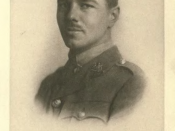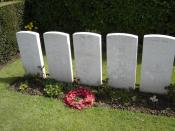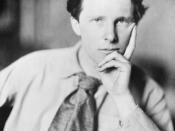"Dulce et Decorum est" - Wilfred Owen"Dulce et Decorum est" is an anti war poem in which Owen conveys the devastating effects of war on the human spirit. He effectively portrays this idea throughout the poem using various techniques such as direct diction, figurative language and imagery. Through this, Owen proves his idea of war being the 'old lie'.
The first stanza of the poem establishes the effects of war on the soldier's spirit. The first line, "Bent double, like old beggars under sacks," describes the soldiers' low morale as they are compared to old beggars. The next line gives an idea of how sick the soldiers are by using the simile "coughing like hags". The "haunting flares" on the next line are a metaphor for their comrades who have died and how their deaths are disturbing the remaining soldiers. The hyperbole then of "men marched asleep" illustrates the utter exhaustion of the soldiers and the following line emphasizes this with the imagery of the soldiers "drunk with fatigue".
The stanza then ends with the soldiers "deaf even to the hoots of gas shells dropping softly behind". This tells us how much their spirit has been effect that even deafening noise of the gas shells seems 'soft'.
The second stanza reveals one of the many traumatic instances which the soldiers found themselves in. The stanza begins with "Gas! Gas! Quick, boys!", a stark contrast to the first stanza. The sudden leap into direct action of the soldiers panicking to but on their gas masks creates a sense of drama. The soldiers then ironically find themselves in an "ecstasy of fumbling", ironic as ecstasy would usually be used to describe immense joy. The stanza is written in direct speech which makes the reader become apart of...



Nice Responses
These are all thought provoking and well written responses. Nice Job, however the fact that you are your only cited source is a little troubling.
0 out of 0 people found this comment useful.